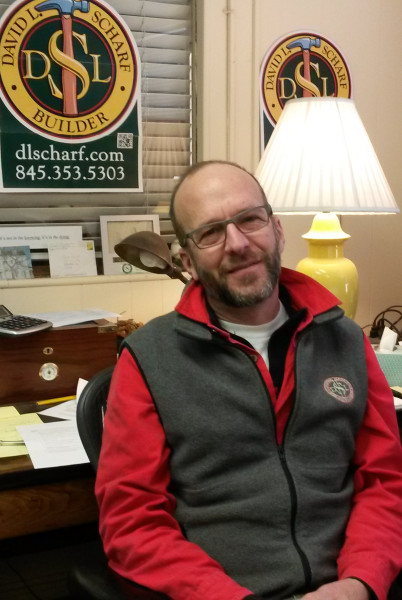
David Scharf in his office.
by Susan Hellauer
Living in the age of climate change means–well, anything and everything. April in February. Alaska in Nyack. The cold air is inside and your gas bill is outsized. Not too handy? Not to worry. Local homebuilder David Scharf has a few tips about how to keep the house warmed up and the bill way down. Spoiler alert: they include spiders.
Windows 101
“First off, go for the low hanging fruit of air sealing,” David said. “If you have double-hung sash windows, make sure that they are completely closed and latched.” If air leaks persist, you can use the clear plastic product with double-stick tape (preferably the heavy duty kind) to seal the entire window. Follow the directions and take your time. All you need is scissors and a hair dryer.
But heed David’s warning: “My sister-in-law did it on a particularly bad window, and I had the sticky tape as a souvenir for years.”
If you have curtains . . .
…Keep them shut as to provide an extra layer of insulation around your windows. On bright days with warmer temperatures, open the curtains and let the sunshine do its work. But, of course, shut them when it’s cloudy, cold, or dark.
A/C woes
David recommended having a professional remove them at the end of the season. Special adhesive-less foam strips (made specially for air conditioners) can help seal leaks between sash panes and around the unit itself. In extreme cases, tape and plastic sheeting can be used over the entire window and air conditioner. And through-the-wall air conditioners can be sealed with a special cover, or with tape and plastic.
Remember, if you’re feeling cold drafts around your air conditioner, it’s good to seal around the unit and sash panes — it works in the summer too.
Exterior doors: It’s complicated
For that under-the-door arctic blast, a fabric draft guard is an easy fix. But if you use that door frequently, you may want a double draft guard that moves with the door. The normal ones sold online are flimsy (I couldn’t even coax mine through half of last winter), but a new “extreme” model is much sturdier. Be sure to measure your door width first. And if you need it in winter, you’ll want it in summer too, as to prevent the cold air from leaking.
And if air is leaking out of the latches, rather than weather strip, make sure both your storm and main doors latch completely. Tighten any loose screws in the latches and door handles.
What about the basement?
It’s probably air-leak central. The outside of window casements can easily be addressed with a caulk or foam product. “If it’s an unfinished basement you’ll want to seal all the penetrations that go up through the ceiling–any pipes, any wires,” Scharf explained. You don’t have to be uber-artistic, just fairly neat.
Those rim joists around the inside perimeter of the basement ceiling are ultra-prone to air leaks and can be improved with a caulk gun and a $10 roll of insulation, made to fit right in there. You’ll also need a straight edge stick and a razor knife, and some free time. (Here’s a helpful video.)
The attic matters.
An attic hatch cover, found online or at big home store, is an easy way to stop drafts and air leaks (measure first, and consider the configuration of your attic steps). Sticky weather stripping–tricky on regular doors–can help create a tight hatch seal.
If your house doesn’t have it, you can roll out fiberglass insulation between the attic floor joists. This stuff can be itchy and scratchy, and installation, though simple, requires acrobatic crawling, so it might be better left to a pro. “You’ll do it once, and you’ll never do it again,” David said. But it pays off all year, every year.
A nice hot shower?
A cold day calls for a scalding shower, right? So wrong! A too-hot, too-long bath or shower can dry out your already coarse winter skin, causing inflammation similar to a sunburn, or even infection. Dermatologists recommend reducing the water temperature and the length of your bath and shower. And guess what? You’ll save more than your skin.
About those arachnids . . .
Scharf’s secret about finding air leaks: “You will have air movement every place you see spider webs. When it’s cold out, you can just put up your hand and feel for movement.”
The single best thing?
“A programmable thermostat,” David answered without hesitation. “Everybody should have one–that’s huge. They typically have settings for different days and times of day.” Though it’s only two wires, the unhandy will probably want to have thermostats installed professionally. But the savings will make it well worth it. You’ll be able to set it, forget it, and save.
You’ve heard this before,
But here it is again: Consider lowering the thermostat. It’s not just a good way to keep fossil fuels in the ground; it’s also better for your health. Scharf keeps blankets on the sofa, and his “children are very attached to their hot water bottles.” When the kids balk at layering up, he tells them, “We are not going to use up more fossil fuel and raise the cost of keeping this place livable just because you’re not going to put on a sweater.” Though–and this is very important–he says it with warmth.








